 Soul of Eon (Eon Warriors #8) by Anna Hackett
Soul of Eon (Eon Warriors #8) by Anna Hackett Format: eARC
Source: author
Formats available: paperback, ebook
Genres: science fiction, science fiction romance, space opera
Series: Eon Warriors #8
Pages: 211
Published by Anna Hackett on February 16, 2021
Purchasing Info: Author's Website, Amazon
Goodreads
The last thing she expects is an instant mating with a handsome alien warrior…just before they are abducted by the deadly Kantos.
Commander Kaira Chand of the Australian Air Force knows the meaning of loss. She lost both her beloved husband and her father over recent years, and she vows never to let a man close again. As head of security for a secret weapons facility in the Australian desert, she’s fighting to protect the scientists working to defend Earth from invasion. That includes working with their allies, the Eon Warriors. What she never expected in her wildest dreams was to find herself instantly mated to a handsome, silver fox alien warrior.
Medical Commander Thane Kann-Eon lives to heal. He’s dedicated to keeping his crew aboard the warship, the Rengard, whole and healthy. Unlike his fellow warriors, he knows he’ll never mate. There hasn’t been a mating in his family for generations. Then a petite Terran commander changes everything. He’s instantly drawn to Kaira, and as soon as their hands touch, he’s stunned by the deluge of emotion that crashes over him. An unheard-of instant mating.
In the midst of their shocking connection, Kaira and Thane find themselves abducted by a Kantos strike team. Taken aboard a battlecruiser, they soon realize the insectoid aliens nabbed the wrong couple, and they are marked for execution. Now they face a wild race for survival that will take them to a distant, deadly world. They’ll both struggle with their raw, intense mating bond, against the backdrop of a Kantos proving ground where everything is out to kill them
My Review:
 Soul of Eon begins in the immediate aftermath of the previous book in this series, the awesome Storm of Eon. Literally. As that story ends, Kaira and Thane experience an incredibly rare instant mating when the Kantos invade and kidnap them both.
Soul of Eon begins in the immediate aftermath of the previous book in this series, the awesome Storm of Eon. Literally. As that story ends, Kaira and Thane experience an incredibly rare instant mating when the Kantos invade and kidnap them both.
There’s a lot to unpack in that description, now that I think about it. Which first leads to saying that this series is probably best read in order, starting from Edge of Eon. A LOT has happened since Eve kidnapped Davion! I’m not sure you’d have to read every single one to get everything in Soul of Eon, but the series is so good!
Where once the Terrans and the Eons were distantly neutral with each other, by the time that Soul of Eon takes place they have united against their common enemy, the insectoid Kantos. It’s not just that the two planets and peoples have come together to face a common foe, in the sense that “the enemy of my enemy is my friend”, but there have been plenty of personal “comings” together as several of the Eon warriors have discovered their mates among the Terrans – to everyone’s complete surprise.
There is an element of “fated mates” in this aspect of the story, along with a bit of the “Mars needs women” trope, but it works pretty well here. It certainly seems like the Terran half of the eventual couple can decide not to pursue the relationship – as Kaira does for a good chunk of Soul of Eon.
Eons are only fertile with their mates, so there’s a whole lot more at stake on their side of the equation but even then, it usually takes a while for the Eon of the couple to figure out that more is happening than just ordinary attraction.
So what Kaira and Thane experience as the story opens – technically as the previous story closed – is that they become instantly aware that they are fated mates. Not that they actually indulge in the sexual aspects of their bond right then and there. Because reasons – and they’re in public! At a party! With his boss!
Which turns out to be a good thing when the Kantos show up. Talk about the potential for an epic case of coitus interruptus!
It’s only after the Kantos, with Kaira and Thane their prisoners, take flight to return to the Kantos fleet that their captors realize that they have kidnapped the wrong couple. The Kantos are planning to “kill the spares” when fate intervenes.
All that Kaira and Thane have to do is survive on a planet filled with predatory flora and fauna, evade the juvenile Kantos who are using them, and each other, as deadly training exercises, and invade a highly secured base where they might possibly have a chance of contacting an Eon warship in time to save their asses – along with the asses of their very unexpected allies.
All in a day’s work for an Eon warrior and his reluctant would-be Terran mate!
 Escape Rating B: I have enjoyed every entry in this and pretty much every single one of this author’s series, and Soul of Eon is no exception to that rule. And it can certainly be said that I had a much better time reading Kaira’s and Thane’s adventure than they had escaping from the Kantos during those same adventures!
Escape Rating B: I have enjoyed every entry in this and pretty much every single one of this author’s series, and Soul of Eon is no exception to that rule. And it can certainly be said that I had a much better time reading Kaira’s and Thane’s adventure than they had escaping from the Kantos during those same adventures!
For this reader, however, this was one of the books in this series that was a lovely reading time but wasn’t special in the way that Storm of Eon and some of the earlier entries in the series were.
Part of that has to do with the characters. I liked Kaira and Thane, but they didn’t stand out for me the way that Finley did in Storm. That being said, I did find it very interesting that Kaira was a widow, and that the reason she initially didn’t want to pursue the mating bond with Thane was that she just wasn’t ready to put her heart on the line again.
But she just didn’t stand out – or up considering Finley’s height – the way that Finley did.
The other thing about this story was that I kept having the feeling that I’d read it before – or at least I’d read something very similar before. I keep thinking that there was another story by this author that had similar elements – the part about the planet itself being out to get them – but the story I know this reminds me of is The Magic Mountains by Alexis Glynn Latner from the Pets in Space 4 Sampler. I’ll admit that this niggled at me a lot, to the point where my attempts to chase down the recollection took me out of the story.
Very much on my other hand, Soul of Eon provided some fascinating revelations about the Kantos, along with a marvelously effective bunch of Kantos rebels who have been mounting quite the effective resistance. And along with that bit of intel, we have a lovely teaser for the next book in the series, King of Eon. In order to cement the alliance between Eon and Terra, the King himself is planning to look for a wife among the Terrans. It’s pretty clear that he thinks he’s going to make a state marriage of convenience.
I’m pretty sure that his plans are not going to survive contact with whoever turns out to be his fated mate. I always love the story in each series where the leader gets setup to take the fall into love, so I’m really looking forward to this one!

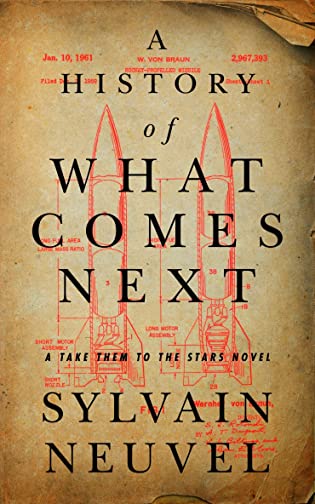 A History of What Comes Next (Take Them to the Stars, #1) by
A History of What Comes Next (Take Them to the Stars, #1) by 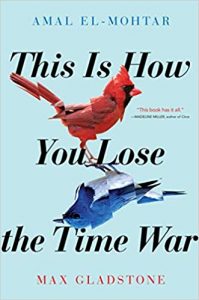 In the end, the book that I was most reminded of was
In the end, the book that I was most reminded of was 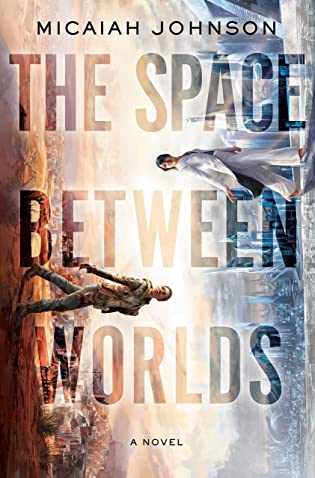 The Space Between Worlds by
The Space Between Worlds by 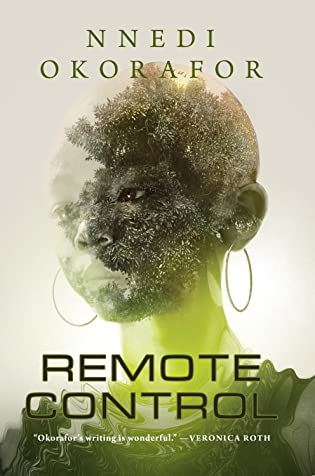 Remote Control by
Remote Control by 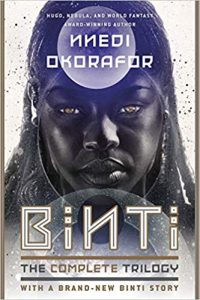 Escape Rating A: Remote Control is a novella, meaning that it is relatively short but complete in and of itself. So if you love SF and have not yet read any of Nnedi’s books, this is a great place to start. As is her absolutely awesome
Escape Rating A: Remote Control is a novella, meaning that it is relatively short but complete in and of itself. So if you love SF and have not yet read any of Nnedi’s books, this is a great place to start. As is her absolutely awesome 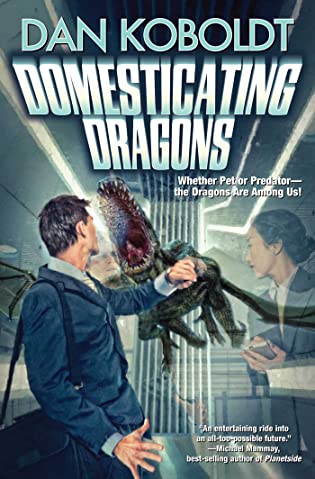 Domesticating Dragons by
Domesticating Dragons by 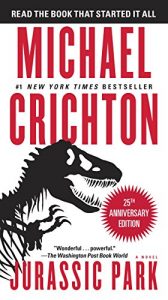 Escape Rating A-: Dragons may be the ultimate in charismatic fauna. They’re certainly right up there with the dinosaurs of Jurassic Park for just how much sheer “grabby hands syndrome” the idea of having one’s very own dragon would create in pretty much anyone.
Escape Rating A-: Dragons may be the ultimate in charismatic fauna. They’re certainly right up there with the dinosaurs of Jurassic Park for just how much sheer “grabby hands syndrome” the idea of having one’s very own dragon would create in pretty much anyone.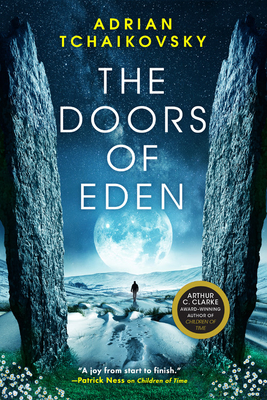 The Doors of Eden by
The Doors of Eden by 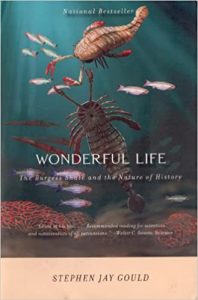 Spy games, cryptids (Sasquatch, Yetis and Loch Ness Monsters, OH MY!) with a nod to Stephen Jay Gould’s
Spy games, cryptids (Sasquatch, Yetis and Loch Ness Monsters, OH MY!) with a nod to Stephen Jay Gould’s 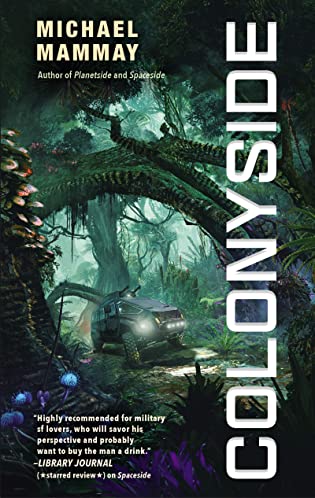 Colonyside (Planetside, #3) by
Colonyside (Planetside, #3) by 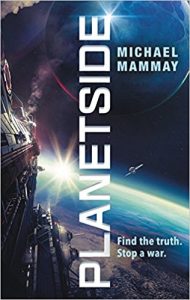 It’s starting to look like Carl Butler’s purpose in the universe is to be an intergalactic scapegoat. Back at the beginning of the series,
It’s starting to look like Carl Butler’s purpose in the universe is to be an intergalactic scapegoat. Back at the beginning of the series, 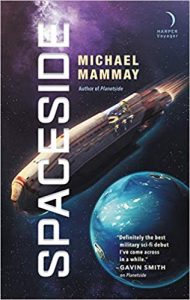 So the mission is kind of Butler’s excuse to get his old “band” back together, but once they’re together they’ve got one hell of a job ahead of them.
So the mission is kind of Butler’s excuse to get his old “band” back together, but once they’re together they’ve got one hell of a job ahead of them.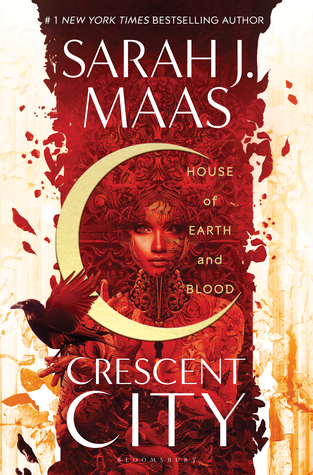 House of Earth and Blood (Crescent City, #1) by
House of Earth and Blood (Crescent City, #1) by 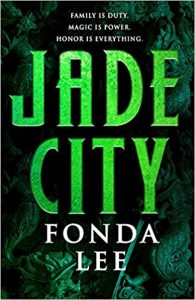 Initially, what dragged me into this story was the sheer complexity of the worldbuilding. This is not a place I’d EVER want to live, because it is seriously fucked up – especially for the original recipe humans – but the mixture of 21st century technology with high-powered magic and authoritarian rule by powerful immortals blends into a world that is both easy to envision and fascinating to explore.
Initially, what dragged me into this story was the sheer complexity of the worldbuilding. This is not a place I’d EVER want to live, because it is seriously fucked up – especially for the original recipe humans – but the mixture of 21st century technology with high-powered magic and authoritarian rule by powerful immortals blends into a world that is both easy to envision and fascinating to explore.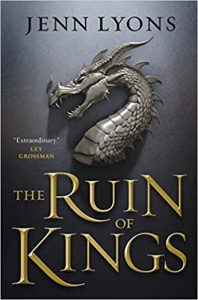 Some of that was language. It felt like all of the physical descriptions of people were repeated whenever they appeared, over and over and over. And it was very obvious that all of the people in this story were all extremely conventionally attractive. But all of the descriptions were overblown, something that was particularly obvious in audio.
Some of that was language. It felt like all of the physical descriptions of people were repeated whenever they appeared, over and over and over. And it was very obvious that all of the people in this story were all extremely conventionally attractive. But all of the descriptions were overblown, something that was particularly obvious in audio. Dune: The Duke of Caladan by
Dune: The Duke of Caladan by 
 Murder by Other Means (The Dispatcher #2) by
Murder by Other Means (The Dispatcher #2) by  Escape Rating A: John Scalzi has a very fine line in snark. In fact, his snarkitude is a good chunk of what I read him – or in this case listen to him – FOR. His characters generally do a marvelous chuckle-with-a-grimace job at making me chuckle with that grimace, because they manage to say all the clever things that most of us figure out long after a conversation is done while said conversation is still going on – when that smart-aleck-ness can be delivered with full force – even if it’s just within the confines of the characters own head.
Escape Rating A: John Scalzi has a very fine line in snark. In fact, his snarkitude is a good chunk of what I read him – or in this case listen to him – FOR. His characters generally do a marvelous chuckle-with-a-grimace job at making me chuckle with that grimace, because they manage to say all the clever things that most of us figure out long after a conversation is done while said conversation is still going on – when that smart-aleck-ness can be delivered with full force – even if it’s just within the confines of the characters own head.